Module 9 Population Unit 1 The population of China is about 1.37 billion.教学课件
文档属性
| 名称 | Module 9 Population Unit 1 The population of China is about 1.37 billion.教学课件 |
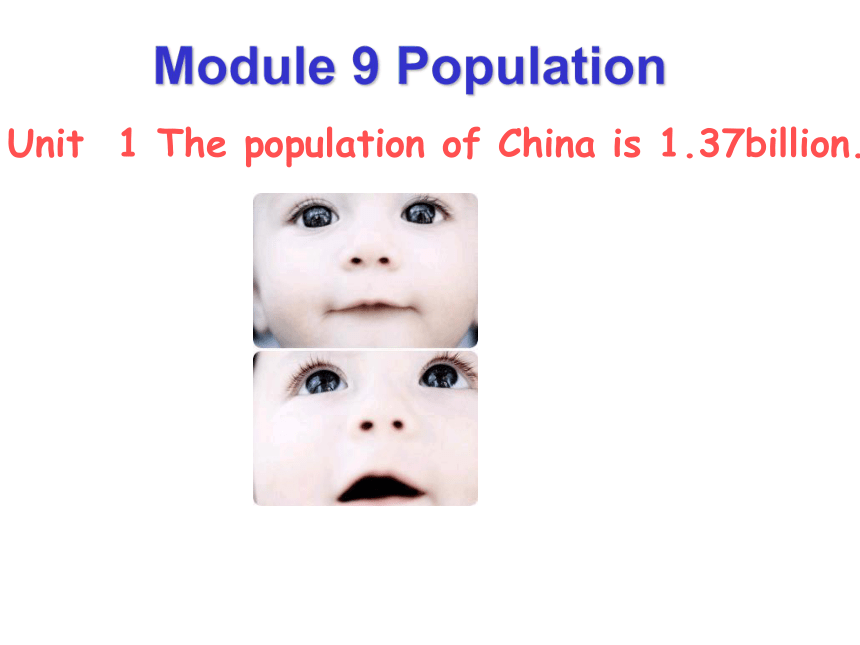
|
|
| 格式 | zip | ||
| 文件大小 | 580.2KB | ||
| 资源类型 | 教案 | ||
| 版本资源 | 外研版 | ||
| 科目 | 英语 | ||
| 更新时间 | 2014-12-23 00:00:00 | ||
图片预览


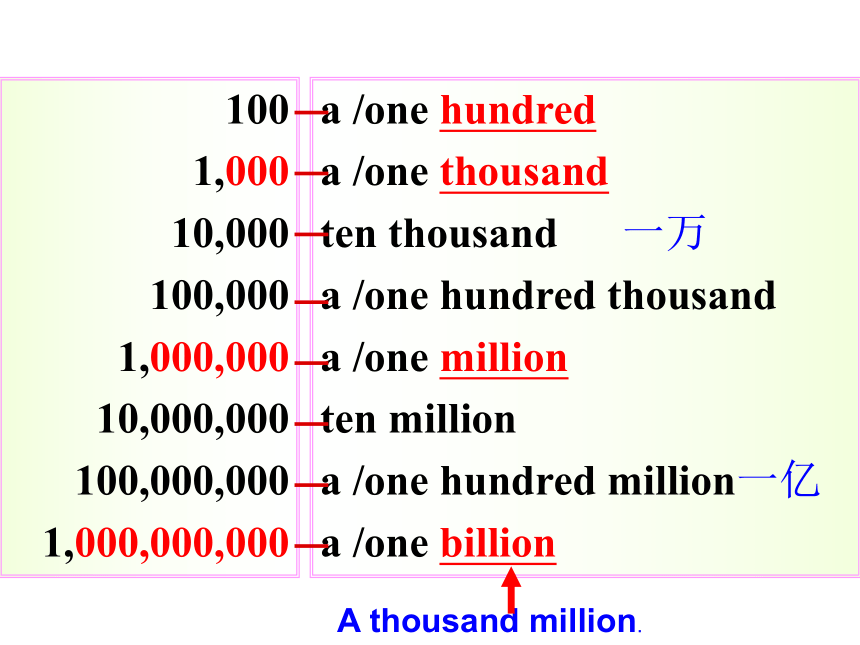


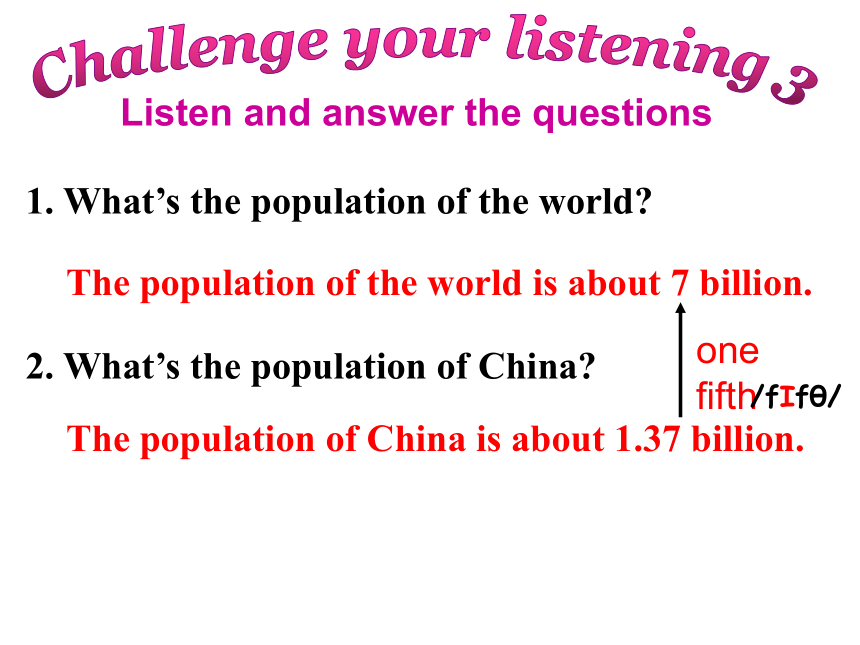
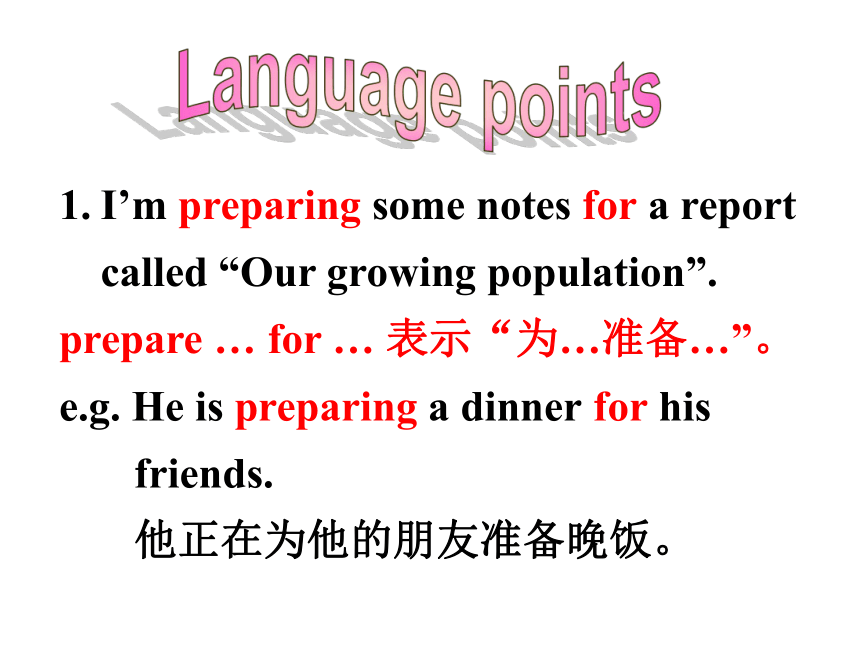
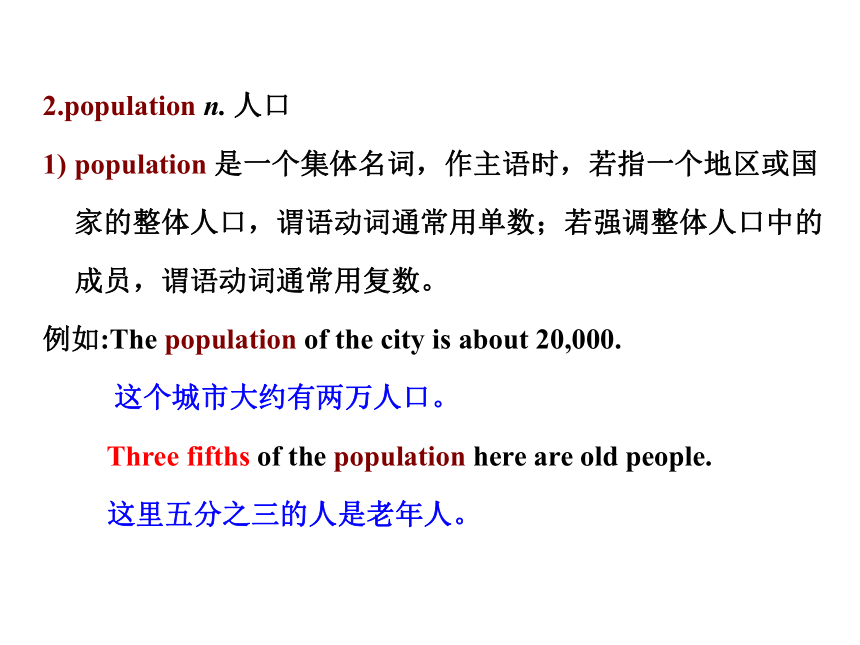
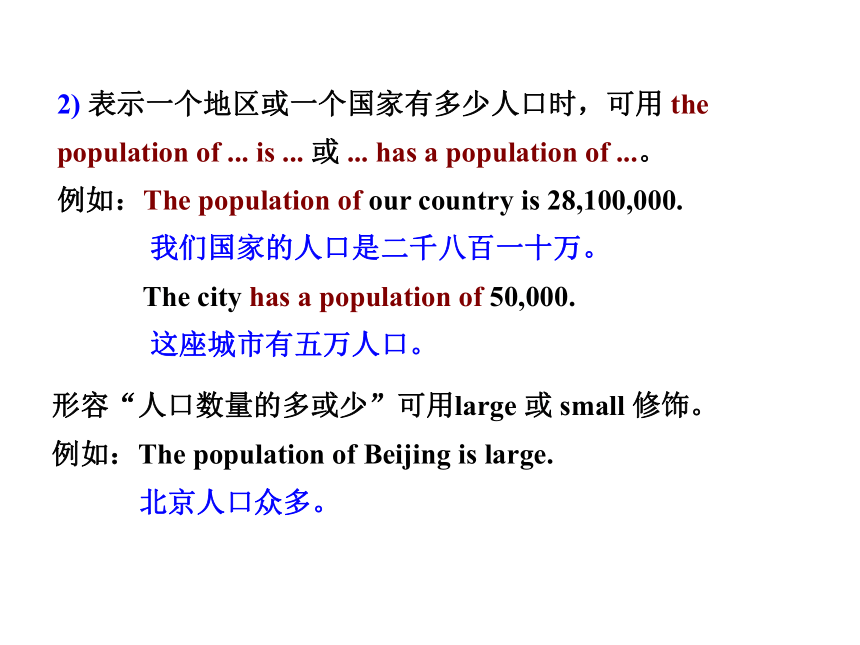

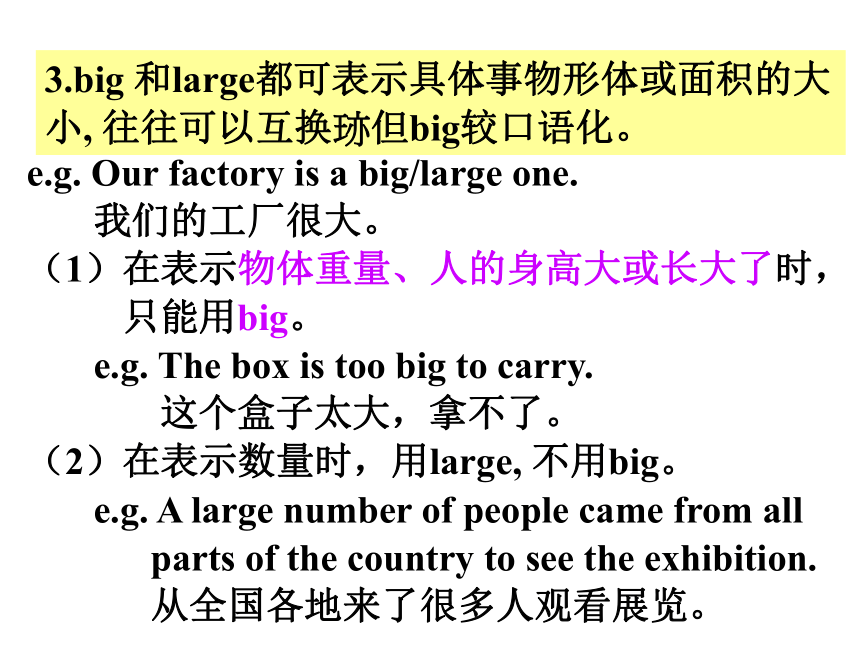

文档简介
课件36张PPT。Module 9 Population
Unit 1 The population of China is 1.37billion. 19347860500780130087029Warming-up 100
1,000
10,000
100,000
1,000,000
10,000,000
100,000,000
1,000,000,000a /one hundred
a /one thousand
ten thousand 一万
a /one hundred thousand
a /one million
ten million
a /one hundred million一亿
a /one billionA thousand million.315,000,00011,000,00027,000,0002,000,000,00046,000,000,0009,000,000Challenge your speaking 1A:What's the population of …?
B:The population of … is about... Listen and answer the questions1. What’s the population of the world?
2. What’s the population of China?
Challenge your listening 3The population of the world is about 7 billion.The population of China is about 1.37 billion.one fifth/fIfθ/I’m preparing some notes for a report called “Our growing population”.
prepare … for … 表示“为…准备…”。
e.g. He is preparing a dinner for his
friends.
他正在为他的朋友准备晚饭。Language points2.population n. 人口
population 是一个集体名词,作主语时,若指一个地区或国家的整体人口,谓语动词通常用单数;若强调整体人口中的成员,谓语动词通常用复数。
例如:The population of the city is about 20,000.
这个城市大约有两万人口。
Three fifths of the population here are old people.
这里五分之三的人是老年人。2) 表示一个地区或一个国家有多少人口时,可用 the population of ... is ... 或 ... has a population of ...。
例如:The population of our country is 28,100,000.
我们国家的人口是二千八百一十万。
The city has a population of 50,000.
这座城市有五万人口。形容“人口数量的多或少”可用large 或 small 修饰。
例如:The population of Beijing is large.
北京人口众多。3) 在询问人口时,要注意 population 和 people 的区别。前者通常用what来提问,后者用how many 来提问。
例如:
What’s the population of Canada?
加拿大的人口是多少?
How many people are there in the hall?
大厅里有多少人?e.g. Our factory is a big/large one.
我们的工厂很大。
(1)在表示物体重量、人的身高大或长大了时,
只能用big。
e.g. The box is too big to carry.
这个盒子太大,拿不了。
(2)在表示数量时,用large, 不用big。
e.g. A large number of people came from all
parts of the country to see the exhibition.
从全国各地来了很多人观看展览。3.big 和large都可表示具体事物形体或面积的大小, 往往可以互换?但big较口语化。E.g. There have been many great presidents in American history.
美国历史上有很多伟大的总统。
在表示抽象意思时, 有也可用big, 但great更为正式。
e.g. Great/Big changes have taken place in our country in recent years.
近几年来?我们国家发生了很大变化。great 的意思是“大、伟大的”?多用于抽象意思。
在修饰具体事物时?带有一定的感彩。huge指巨大的?往往指体积。
e.g. a huge stone, a huge building等。 4. That causes a lot of problems, such as too much traffic and noise.
too many 后面加可数名词,表示 “太多的”。
too much 后面加不可数名词,表示“太多的”。Babies born every minute in the world:
Babies born every year in the world:
Population of China:
Population of the world:Complete the notes.over 250131.4 million
5. The population of China is about 1.37 billion.
billion(十亿), million (百万), thousand (千)都是数字单位。当前面有数词时,这些数字单位不加s,当前面没有数词时,这些数词后面加s和of。Babies born every minute in the world:
Babies born every year in the world:
Population of China:
Population of the world:Complete the notes.over 250131.4 millionabout 1.37 billion6. That’s almost one fifth of the world’s population, ...
one fifth 表示“五分之一”,fifth是序数词。
分数的表达:分子用基数词,分母用序数词。分子大于1时,分母 + s。
e.g. 2/5: two fifthsBabies born every minute in the world:
Babies born every year in the world:
Population of China:
Population of the world:Complete the notes.over 250131.4 millionabout 1.37 billionabout 7 billionChoose the correct answer.1. Birth happens at the start / at the end of life.
2. Huge means large / small.
3.An increase in population means more / fewer people.
4. Hang on a minute means waiting for
a short time / a long time.5. Making notes means writing a long passage / a few words.
6. A problem is something easy / difficult.
7. A report is a long piece of writing / a few words.
8. A billion is a hundred / a thousand million.1.为…准备笔记
2.我们日益增长的人口
3.在正确的地方
4.谈论
4.一座大城市
5.大量的人口
6.引起很多问题
7.例如
8.太多的交通
9.不仅
10.人口增长
prepare some notes for… in the right place talk about a huge city cause a lot of problems a large population such as too much traffic our growing population not only population increase11.一个大问题
12.出生
13.我不相信
14.…的人口
15.五分之一
16.世界人口
17.也就是说
18.稍等(一分钟)
19.写下
20.在将来
21. (人口)变得越来越少 a big problem be born I can’t believe it. one fifth Hang on a minute. write down in the future get smaller the population ofthe world’s populationthat isbillionmillionthousandcomma
逗号
1, 234, 567, 891Grammar
数字的表达朗读时,将每三位数看做一个单位,从左到右依次为billion,million,thousand。每个单位按照百、十、个位向下读,其中百位到十位之间要加入 and。
e.g. 729 :seven hundred and twenty nine.
6,500,431,729:six billion, five hundred
million, four hundred and thirty one
thousand, seven hundred and twenty nine. 2,314
1,370,000,000
2,000,030,000
two thousand, three hundred and fourteen
one billion, three hundred and seventy million
two billion and thirty thousand1.37billion
131.4billionone point three seven billion
one hundred and thirty-one point four billion小数点读:pointa huge city
too much traffictoo many peopletoo much noiselarge population
causes many problemsnot enough spaceModule 9
Unit 1new wordslannguage large numbersnoise,prepare,notes,
report,grow,huge,cause,
problem,increase,birth,
billion,fifth,hang on
1.-What' the populaton of...?
-The population of .. is...
2.That's almost one fifth
of the world population.summary2,000,003
3,120,000,000
收获时刻Grammar Focus(二)冠词 Articles一.冠词的定义 冠词是一种虚词,没有词义,没有数和格的变化,不能单独使用,只能帮助名词或起名词作用的其他词类说明其意义。
冠词分定冠词和不定冠词两大类。定冠词特指一特定名词,不定冠词泛指一般普通名词。二.不定冠词的用法不定冠词有a和an两种形式,a用在以辅音开头的名词前,an用在以元音开头的名词前。它的用法如下:
1.表示“一个”的意思,与数词one相同。
例如:Rome was not built in a day.
罗马不是一天建成的;伟业非一日之功
The project(项目,计划) will be carried out(执行,贯策) in a year or two.2.表示一类人或事物。
例如:A dog is a faithful(忠诚的) animal.
Even a woman can do it.
3.表示“每一”,相当于per,用于某些表示时
间、重量、长度等单位前。
例如:He earns two thousand yuan a month.
The train is running sixty miles(英
里)an hour.
4.表示同样的人或事物,相当于the same。
例如:Birds of a feather(羽毛) flock (一群)together./They are people of a kind.
一群同样羽毛的鸟在一起/物以类聚,人以群分。 5.物质名词或抽象名词前用a 或an表示具体意义、制成品或种类。
例如:Green tea is a wonderful tea.
She is a beauty.(美人)
Please give me a coffee.
6.用于人名前,表示说话者对此人不认识,相当于“a certain”,也可指于某名人有类似性质的人或事物。
例如:A Mr. Chen came to see you this morning.
He wishes to become a Newton.7.有些世界上独一无二的东西,如sun, moon, sky, universe(宇宙),world(世间,地球) ,earth (地球)等,一般前面要用定冠词,但当他们前面有修饰语时,则要用不定冠词。
例如:We hope we can see a full moon
tonight.
He sat in a chair, looking at a starry 布满星星的 sky.8. 在作单数可数名词定语的形容词最高级前,
如果不表示“最”,而表“非常”,则用不定冠词。例如:
That is a best dictionary.
This is a most troublesome(费事的) case.
(情形,情况)
9. 序数词前,一般有定冠词,但当表示“又一
个”时,则要用不定冠词。
例如:They have a second house.
When I sat down, a fifth man rose
(动词,rise的过去式 “站起来”)to speak.
10. 季节、月份、日期、三餐前有修饰语时,
用不定冠词。
例如:We had a wonderful lunch.
We had a very cold winter last year.
11. 用在某些固定的短语中
例如:once upon a time (从前) in a hurry
(匆匆忙忙)
have a rest have a good time
have a look all of a sudden (突然地)
have a cold/fever(发热)/cough/headache/
pain(疼痛)Homework Level A Learn the new vocabulary in unit 1
and read the large numbers in activity 5
Level B Research the population of your city
and make a graph to show how the
population increase. Write a paragraph
to describe your graph.
Unit 1 The population of China is 1.37billion. 19347860500780130087029Warming-up 100
1,000
10,000
100,000
1,000,000
10,000,000
100,000,000
1,000,000,000a /one hundred
a /one thousand
ten thousand 一万
a /one hundred thousand
a /one million
ten million
a /one hundred million一亿
a /one billionA thousand million.315,000,00011,000,00027,000,0002,000,000,00046,000,000,0009,000,000Challenge your speaking 1A:What's the population of …?
B:The population of … is about... Listen and answer the questions1. What’s the population of the world?
2. What’s the population of China?
Challenge your listening 3The population of the world is about 7 billion.The population of China is about 1.37 billion.one fifth/fIfθ/I’m preparing some notes for a report called “Our growing population”.
prepare … for … 表示“为…准备…”。
e.g. He is preparing a dinner for his
friends.
他正在为他的朋友准备晚饭。Language points2.population n. 人口
population 是一个集体名词,作主语时,若指一个地区或国家的整体人口,谓语动词通常用单数;若强调整体人口中的成员,谓语动词通常用复数。
例如:The population of the city is about 20,000.
这个城市大约有两万人口。
Three fifths of the population here are old people.
这里五分之三的人是老年人。2) 表示一个地区或一个国家有多少人口时,可用 the population of ... is ... 或 ... has a population of ...。
例如:The population of our country is 28,100,000.
我们国家的人口是二千八百一十万。
The city has a population of 50,000.
这座城市有五万人口。形容“人口数量的多或少”可用large 或 small 修饰。
例如:The population of Beijing is large.
北京人口众多。3) 在询问人口时,要注意 population 和 people 的区别。前者通常用what来提问,后者用how many 来提问。
例如:
What’s the population of Canada?
加拿大的人口是多少?
How many people are there in the hall?
大厅里有多少人?e.g. Our factory is a big/large one.
我们的工厂很大。
(1)在表示物体重量、人的身高大或长大了时,
只能用big。
e.g. The box is too big to carry.
这个盒子太大,拿不了。
(2)在表示数量时,用large, 不用big。
e.g. A large number of people came from all
parts of the country to see the exhibition.
从全国各地来了很多人观看展览。3.big 和large都可表示具体事物形体或面积的大小, 往往可以互换?但big较口语化。E.g. There have been many great presidents in American history.
美国历史上有很多伟大的总统。
在表示抽象意思时, 有也可用big, 但great更为正式。
e.g. Great/Big changes have taken place in our country in recent years.
近几年来?我们国家发生了很大变化。great 的意思是“大、伟大的”?多用于抽象意思。
在修饰具体事物时?带有一定的感彩。huge指巨大的?往往指体积。
e.g. a huge stone, a huge building等。 4. That causes a lot of problems, such as too much traffic and noise.
too many 后面加可数名词,表示 “太多的”。
too much 后面加不可数名词,表示“太多的”。Babies born every minute in the world:
Babies born every year in the world:
Population of China:
Population of the world:Complete the notes.over 250131.4 million
5. The population of China is about 1.37 billion.
billion(十亿), million (百万), thousand (千)都是数字单位。当前面有数词时,这些数字单位不加s,当前面没有数词时,这些数词后面加s和of。Babies born every minute in the world:
Babies born every year in the world:
Population of China:
Population of the world:Complete the notes.over 250131.4 millionabout 1.37 billion6. That’s almost one fifth of the world’s population, ...
one fifth 表示“五分之一”,fifth是序数词。
分数的表达:分子用基数词,分母用序数词。分子大于1时,分母 + s。
e.g. 2/5: two fifthsBabies born every minute in the world:
Babies born every year in the world:
Population of China:
Population of the world:Complete the notes.over 250131.4 millionabout 1.37 billionabout 7 billionChoose the correct answer.1. Birth happens at the start / at the end of life.
2. Huge means large / small.
3.An increase in population means more / fewer people.
4. Hang on a minute means waiting for
a short time / a long time.5. Making notes means writing a long passage / a few words.
6. A problem is something easy / difficult.
7. A report is a long piece of writing / a few words.
8. A billion is a hundred / a thousand million.1.为…准备笔记
2.我们日益增长的人口
3.在正确的地方
4.谈论
4.一座大城市
5.大量的人口
6.引起很多问题
7.例如
8.太多的交通
9.不仅
10.人口增长
prepare some notes for… in the right place talk about a huge city cause a lot of problems a large population such as too much traffic our growing population not only population increase11.一个大问题
12.出生
13.我不相信
14.…的人口
15.五分之一
16.世界人口
17.也就是说
18.稍等(一分钟)
19.写下
20.在将来
21. (人口)变得越来越少 a big problem be born I can’t believe it. one fifth Hang on a minute. write down in the future get smaller the population ofthe world’s populationthat isbillionmillionthousandcomma
逗号
1, 234, 567, 891Grammar
数字的表达朗读时,将每三位数看做一个单位,从左到右依次为billion,million,thousand。每个单位按照百、十、个位向下读,其中百位到十位之间要加入 and。
e.g. 729 :seven hundred and twenty nine.
6,500,431,729:six billion, five hundred
million, four hundred and thirty one
thousand, seven hundred and twenty nine. 2,314
1,370,000,000
2,000,030,000
two thousand, three hundred and fourteen
one billion, three hundred and seventy million
two billion and thirty thousand1.37billion
131.4billionone point three seven billion
one hundred and thirty-one point four billion小数点读:pointa huge city
too much traffictoo many peopletoo much noiselarge population
causes many problemsnot enough spaceModule 9
Unit 1new wordslannguage large numbersnoise,prepare,notes,
report,grow,huge,cause,
problem,increase,birth,
billion,fifth,hang on
1.-What' the populaton of...?
-The population of .. is...
2.That's almost one fifth
of the world population.summary2,000,003
3,120,000,000
收获时刻Grammar Focus(二)冠词 Articles一.冠词的定义 冠词是一种虚词,没有词义,没有数和格的变化,不能单独使用,只能帮助名词或起名词作用的其他词类说明其意义。
冠词分定冠词和不定冠词两大类。定冠词特指一特定名词,不定冠词泛指一般普通名词。二.不定冠词的用法不定冠词有a和an两种形式,a用在以辅音开头的名词前,an用在以元音开头的名词前。它的用法如下:
1.表示“一个”的意思,与数词one相同。
例如:Rome was not built in a day.
罗马不是一天建成的;伟业非一日之功
The project(项目,计划) will be carried out(执行,贯策) in a year or two.2.表示一类人或事物。
例如:A dog is a faithful(忠诚的) animal.
Even a woman can do it.
3.表示“每一”,相当于per,用于某些表示时
间、重量、长度等单位前。
例如:He earns two thousand yuan a month.
The train is running sixty miles(英
里)an hour.
4.表示同样的人或事物,相当于the same。
例如:Birds of a feather(羽毛) flock (一群)together./They are people of a kind.
一群同样羽毛的鸟在一起/物以类聚,人以群分。 5.物质名词或抽象名词前用a 或an表示具体意义、制成品或种类。
例如:Green tea is a wonderful tea.
She is a beauty.(美人)
Please give me a coffee.
6.用于人名前,表示说话者对此人不认识,相当于“a certain”,也可指于某名人有类似性质的人或事物。
例如:A Mr. Chen came to see you this morning.
He wishes to become a Newton.7.有些世界上独一无二的东西,如sun, moon, sky, universe(宇宙),world(世间,地球) ,earth (地球)等,一般前面要用定冠词,但当他们前面有修饰语时,则要用不定冠词。
例如:We hope we can see a full moon
tonight.
He sat in a chair, looking at a starry 布满星星的 sky.8. 在作单数可数名词定语的形容词最高级前,
如果不表示“最”,而表“非常”,则用不定冠词。例如:
That is a best dictionary.
This is a most troublesome(费事的) case.
(情形,情况)
9. 序数词前,一般有定冠词,但当表示“又一
个”时,则要用不定冠词。
例如:They have a second house.
When I sat down, a fifth man rose
(动词,rise的过去式 “站起来”)to speak.
10. 季节、月份、日期、三餐前有修饰语时,
用不定冠词。
例如:We had a wonderful lunch.
We had a very cold winter last year.
11. 用在某些固定的短语中
例如:once upon a time (从前) in a hurry
(匆匆忙忙)
have a rest have a good time
have a look all of a sudden (突然地)
have a cold/fever(发热)/cough/headache/
pain(疼痛)Homework Level A Learn the new vocabulary in unit 1
and read the large numbers in activity 5
Level B Research the population of your city
and make a graph to show how the
population increase. Write a paragraph
to describe your graph.
同课章节目录
- Module 1 How to learn English
- Unit 1 Let's try to speak English as much as possi
- Unit 2 You should smile at her.
- Unit 3 Language in use .
- Module 2 My home town and my country
- Unit 1 It's taller than many other buildings.
- Unit 2 Cambridge is a beautiful city in the east o
- Unit 3 Language in use .
- Module 3 Sports.
- Unit 1 Nothing is more exciting than playing tenni
- Unit 2 This year we training more carefully.
- Unit 3 Language in use .
- Module 4 Planes, ships and trains .
- Unit 1 He lives the farthest from school.
- Unit 2 What is the best way to travel.
- Unit 3 Language in use .
- Module 5 Lao She Teahouse.
- Unit 1 I wanted to see the Beijing Opera.
- Unit 2 It descibes the changes in Chinese society.
- Unit 3 Language in use .
- Module 6 Animals in danger.
- Unit 1 It allows people to get closer to them .
- Unit 2 The WWF is working hard to save them all.
- Unit 3 Language in use .
- Revision module A
- Module 7 A famous story
- Unit 1 Alice was sitting with her sister by the ri
- Unit 2 She was thinking about her cat.
- Unit 3 Language in use .
- Module 8 Accidents
- Unit 1 While the car were changing to red, a car s
- Unit 2 I was trying to pick it up when it bite me
- Unit 3 Language in use .
- Module 9 Population
- Unit 1 The population of China is about 1.37 billi
- Unit 2 Arnwick was a city with 200,000 people.
- Unit 3 Language in use .
- Module 10 The weathe
- Unit 1 It might snow.
- Unit 2 The weather is fine all year round.
- Unit 3 Language in use .
- Module 11 Way of life
- Unit 1 In China ,we open a gift later.
- Unit 2 In England, you usually drink tea with milk
- Unit 3 Language in use .
- Module 12 Help
- Unit 1 What should we do before help arrives?
- Unit 2 Stay away from windows and heavy furniture.
- Unit 3 Language in use .
- Revision module B
